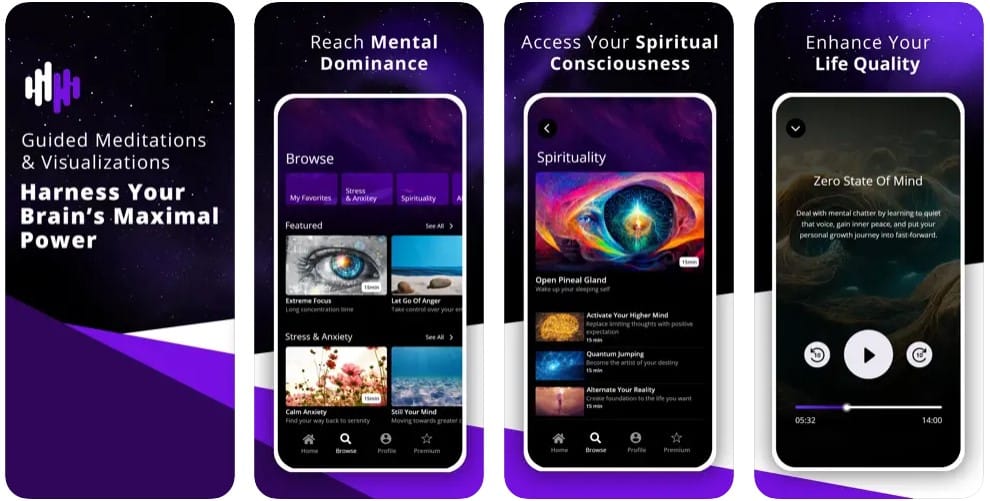Feeling weighed down by a constant state of emotional pain can leave you feeling lost and overwhelmed. The journey towards healing such wounds is often layered, complex, and involves recognizing the need for change.
This article provides an easy-to-understand guide through the 7 stages of emotional healing. Healing that could pave your path to inner peace and transformation. Ready to embark on this transformative journey? Let’s get started!
Start by trying this guided meditation!

Unleash Your True Potential!
Explore the world of meditation with our powerful guided sessions crafted to bring peace and strength to your spirit.
But first, let’s ensure our sessions are the perfect fit for you.
Take our short quiz to find out!
Table of contents
- What is Emotional Healing?
- The 7 Stages of Emotional Healing
- Awareness: Recognizing and acknowledging your emotions
- Honesty: Being honest with yourself about your feelings
- Expression: Finding healthy ways to express your emotions
- Regulation: Learning to regulate and manage your emotions
- Reflection: Reflecting on your experiences and gaining insight
- Transformation: Making positive changes and growth
- Tools for Emotional Healing
- Signs of Emotional Healing
- Conclusion
- FAQs
What is Emotional Healing?
Emotional healing is the process of recovering from emotional wounds and finding inner peace by exploring, acknowledging, and transforming negative feelings into positive growth.
Understanding the process of healing from emotional wounds

Emotional wounds, much like physical ones, require time and specific strategies to heal. The healing journey typically starts with an awareness of the pain. It’s crucial to acknowledge and understand these intense feelings instead of ignoring or suppressing them.
Remember that this process doesn’t adhere to a set timeline. It varies for each person depending on their unique needs and circumstances. Emotional healing involves releasing trapped grief and anger, two powerful emotions often stemming from trauma.
This therapeutic approach seeks not only to identify but also to let go of deep-seated emotional blockages. Emotional blockages that may inhibit growth and wellness. Alongside embracing undesirable emotions, adopting gratitude can remarkably enhance your healing quality by reframing your perspective towards positivity.
Throughout this transformative journey, you might experience physical symptoms as your body attempts to recover from mental injuries. It’s proof that emotional healing is indeed a holistic process entailing both mental and physical recovery.
How emotional healing can transform your life
Emotional healing fosters profound change, steering your life towards positivity and fulfillment. It’s a transformative process that starts with regaining inner power to overcome the echoes of traumatic experiences and deep-rooted wounds.
As you traverse through this self-reflective journey, you begin acknowledging painful thoughts, feelings, and emotions. These are all crucial steps in reshaping your emotional terrain.
Moreover, emotional healing amplifies self-love by improving your self-image. This wonderfully freeing process empowers you to eradicate negative thoughts that have been holding you back.

Unleash Your True Potential!
Explore the world of meditation with our powerful guided sessions crafted to bring peace and strength to your spirit.
But first, let’s ensure our sessions are the perfect fit for you.
Take our short quiz to find out!
The 7 Stages of Emotional Healing
In the journey of emotional healing, there are seven stages that one may go through. Stages of wareness, honesty, expression, regulation, reflection, transformation, and growth.
Some may say that there are only five stages, denial, anger, bargaining, depression, and acceptance. However, if we take a deeper dive and focus on getting past the secondary emotion and letting go of deep sadness, what we find is the seven steps.
There can be stages like feeling stuck, pain, and grief, and you may also feel overwhelmed. After overcoming these stages of healing, the shock wears off, and you heal.
Awareness: Recognizing and acknowledging your emotions

In the journey of emotional healing, awareness plays a crucial role in transforming your entire life. It starts with recognizing and acknowledging your emotions without judgment or suppression.
Increasing your self-awareness allows you to name the feelings you are experiencing. This is the first step towards resolving negative emotions. By being aware of how certain situations impact your emotional state, you can begin to understand the root of pain. It helps you start moving forward on the path to healing.
This process requires patience and self-compassion as you navigate through various stages of emotional healing, but it is an essential step towards finding peace and embracing personal growth.
Honesty: Being honest with yourself about your feelings

Being honest with yourself about your feelings is a crucial step in the process of emotional healing. It requires facing your emotions head-on without judgment or criticism. By acknowledging and accepting your real feelings, you can begin to understand their root causes and work through them effectively.
Honesty with yourself also means removing self-pity and invalidating thoughts that may be holding you back from healing. It can be challenging to confront painful emotions, but by being honest with yourself, you open the door to self-awareness and personal growth.
This stage of emotional healing sets the foundation for moving forward towards a happier and more fulfilling life.
Expression: Finding healthy ways to express your emotions

Expression is a crucial stage in the process of emotional healing. It involves finding healthy ways to express your emotions rather than bottling them up or suppressing them. By expressing your emotions, you give yourself permission to feel and release what you are experiencing inside.
This can be done through various means, such as talking to a trusted friend or therapist, writing in a journal, engaging in creative activities like painting or dancing, or even practicing mindfulness and meditation.
Finding healthy outlets for your emotions allows you to release the built-up tension and find relief from emotional pain. It also helps you gain clarity and understanding about what you are feeling, which is essential for healing.
Regulation: Learning to regulate and manage your emotions

Learning to regulate and manage your emotions is a crucial stage of emotional healing. It involves developing the skills and strategies needed to effectively navigate through painful emotions and achieve a sense of balance in your life.
By becoming aware of emotions you experience, you can better understand their triggers, patterns, and intensity. This awareness allows you to respond rather than react to your emotions, giving you greater control over how they impact your thoughts, behaviors, and overall well-being.
Emotion-focused therapy techniques and interventions can provide valuable tools for regulating emotions by promoting self-strength and regulation skills. Additionally, creating a supportive environment that encourages open expression of emotions can aid in the process of emotional healing as well.
Reflection: Reflecting on your experiences and gaining insight

Reflection is a vital stage in the emotional healing process that allows you to gain insight and understanding from your experiences. It involves taking time to pause, look back, and examine your emotions, thoughts, and actions.
Through reflection, you can uncover patterns, triggers, and the root causes of your emotional pain. This self-examination helps you make sense of what happened and why it affected you the way it did.
By reflecting on personal experiences, you can gain valuable wisdom that empowers personal growth and guides you towards making positive changes in your life. It is through this deep introspection that transformation truly begins to take place.
Transformation: Making positive changes and growth

Transformation is a crucial stage in the process of emotional healing. It involves making positive changes and experiencing personal growth that can completely transform your life.
During this stage, you have gained self-awareness and insight from reflecting on your experiences. Armed with this newfound knowledge, you are ready to take action to create a better future for yourself.
Making positive changes may involve letting go of unhealthy patterns, setting boundaries, or developing new coping mechanisms. It’s about consciously choosing behaviors and thoughts that promote healing and well-being.
As you make these changes, you’ll start to notice improvements in various aspects of your life – relationships become healthier, communication becomes more effective, and you develop greater emotional resilience.
Embracing transformation requires patience and perseverance, as it is a continuous process. But by taking small steps each day towards positive change, you will find yourself moving forward in your healing with renewed hope and strength.
Tools for Emotional Healing
There are various tools available to help you throughout the healing, from the earlier stages to the final stage of healing.
Healing with support from Guided Meditation Apps
Guided meditation apps can provide invaluable support on your journey. Many apps like Enhanced Meditation App offer a range of tools and resources to help you process painful events, release painful emotions, and promote mental wellness.
For example, Calm is a popular mindfulness and meditation app that offers guided meditations and relaxing sleep stories to help you live a more stress-free life. Research has shown that meditation has numerous benefits for mental health, including reducing stress, improving concentration, and promoting overall well-being.

By incorporating these apps into your healing, you can empower yourself with effective techniques to find inner peace and transform your life.
Seeking therapy or counseling
Seeking therapy or counseling is a highly effective way to facilitate emotional healing and transformation in your life. A licensed therapist can provide you with the guidance, support, and tools needed to work through painful experiences and strong emotions.
Therapy sessions offer a safe space for you to express yourself openly and honestly, allowing you to gain insights into the real causes of your emotional pain. Through various therapeutic approaches, such as Internal Family Systems Therapy, counselors can help increase self-compassion and provide techniques for coping with painful emotions.
Addressing trauma and seeking professional help are crucial steps towards achieving healing and well-being in your life.
Journaling and self-reflection
Journaling and self-reflection are powerful tools for emotional healing. By writing down your thoughts and feelings about personal experiences, you create a safe space for private reflection and emotional processing.
Scientific research supports the benefits of journaling for mental health. This simple yet effective practice can truly help you find peace, acceptance, and growth.
Engaging in activities that bring happiness and peace
These activities can shift your focus away from negative emotions and create moments of positivity and relaxation. Whether it’s spending time in nature, practicing a hobby you love, listening to uplifting music, or engaging in physical exercise.
Research shows that engaging in pleasurable activities releases endorphins, which are natural mood boosters. It also helps reduce stress levels a lot and promotes feelings of calmness and contentment.
Signs of Emotional Healing
Signs of emotional healing include experiencing a sense of peace and acceptance, increased emotional resilience, improved relationships and communication, as well as greater self-awareness and self-confidence.

Feeling a sense of peace and acceptance
As you progress through the 7 stages of emotional healing, one of the signs that you are on the right path is feeling a sense of peace and acceptance within yourself. This means that you have come to terms with your past pain and have made significant strides in letting go of any negative emotions or resentment.
Instead, there is a newfound calmness that permeates your being, allowing you to fully embrace the present moment without being weighed down by past hurts. With this peace comes a greater ability to enjoy life, form healthier relationships, and experience growth.
Increased emotional resilience
Developing increased emotional resilience is a key sign of healing, as it allows individuals to navigate through life’s challenges with greater ease and adaptability. Emotionally resilient people are better equipped to bounce back from setbacks.
Research shows that resilience can be learned, leading to positive outcomes in various areas of life. By strengthening coping mechanisms, building a supportive network, practicing self-care, and developing healthy emotional regulation skills, individuals can enhance their emotional resilience and experience the transformative power of healing.
Improved relationships and communication
Improved relationships and communication are key indicators of emotional healing. As you go through the 7 stages of emotional healing, you’ll find that your ability to connect with others on a deeper level improves.
You become more aware of your own emotions and can express yourself more effectively, which leads to better understanding and empathetic communication with others. This newfound self-awareness also allows you to set healthier boundaries in your relationships, fostering trust and mutual respect.
As you heal emotionally, conflicts become opportunities for growth rather than sources of distress, leading to stronger and more fulfilling connections with the people around you.
Greater self-awareness and self-confidence
As you progress through the 7 stages of emotional healing, you will begin to notice signs of transformation in your life. Greater self-awareness and self-confidence are two essential aspects that emerge during this journey.
Moreover, as you heal emotionally, you will experience an increase in self-confidence. By acknowledging and working through your past wounds, negative thoughts and beliefs about yourself gradually diminish.
As a result, your perception of yourself shifts, leading to improved self-esteem and confidence in your abilities. With this newfound sense of empowerment, you can navigate life’s challenges with greater ease and approach new opportunities with optimism.
It is important to note that the journey towards greater self-awareness and self-confidence varies for each individual. However, by incorporating practices such as mindfulness, therapy or counseling, journaling, or activities that bring joy into daily life, one can enhance their emotional healing process.
Conclusion
In conclusion, understanding and embarking on the 7 stages of emotional healing can truly be a game-changer in transforming your life. By recognizing and acknowledging your emotions, being honest with yourself, finding healthy ways to express and regulate your feelings, reflecting on your experiences, making positive changes, and ultimately forgiving yourself and others, you can experience true healing and growth.
Take this guide as a roadmap for navigating through your emotional wounds, and watch as it leads you to a place of peace, resilience, awareness, improved relationships, and a greater sense of being.
Your journey towards emotional healing starts now!
FAQs
What are the 7 stages of emotional healing?
The 7 stages of emotional healing are: awareness, acceptance, self-reflection, forgiveness, letting go, rebuilding, and transformation. These stages represent a journey towards healing and personal growth.
How can I become more aware of my emotions?
Becoming more aware of your emotions involves practicing mindfulness and paying attention to your thoughts, feelings, and bodily sensations without judgment. Journaling or seeking therapy can also help in exploring and understanding your emotions better.
How do I forgive someone who has hurt me deeply?
Forgiveness is a process that takes time and effort. It involves acknowledging the pain caused by the person who hurt you, empathizing with their perspective if possible, releasing resentment and anger, setting boundaries for future interactions if necessary, and focusing on your own healing rather than seeking revenge.










